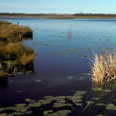 A controversial land swap proposal could open portions of an Alaska wildlife refuge to oil drilling, but the scheme is already dividing native Alaskans.
A controversial land swap proposal could open portions of an Alaska wildlife refuge to oil drilling, but the scheme is already dividing native Alaskans.
Supporters of the plan to exchange land in the Yukon Flats National Wildlife Refuge, which lies just south of the more-famous ANWR, want the plan approved before the pro-oil Bush Administration leaves office in November.
“The window is the election,” argues pro-oil die-hard Alaska Republican Don Young, a staunch backer of the plan. “We’d like to have an executive order out of the administration before they leave office.”
The proposed land trade would give 110,000 acres of hydrocarbon-prone uplands within the refuge, plus mineral rights to another 97,000 acres, to Fairbanks-based Doyon, owned by Athabascan Indians of interior Alaska. In exchange, the refuge would gain 150,000 acres of bird-friendly wetlands now owned by Doyon, plus 56,500 acres on which Doyon has pending land claims.
“You can have both the subsistence lifestyle and the protection of that lifestyle, and you can have oil and gas exploration,” said Norm Phillips, Doyon’s resource manager.
But many people living closest to the potential development — many of them Doyon shareholders — oppose the plan because of the likelihood of oil pollution and the possibility of social upheaval such as a flow of drugs, alcohol and poachers over new roads.
“Usually, the indigenous people are at the losing end of any sort of oil development,” said Dacho Alexander, first chief of the Gwichyaa Zhee Gwich’in Tribe in Fort Yukon, a village of 600 near the proposed exchange parcels.
Alexander has a point -there are countless indigenous communities from the Arctic to the Amazon to Africa that have suffered because of oil development. Why does Doyon think things will be any different?
